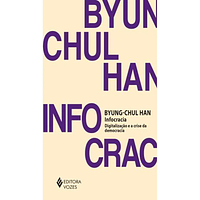You need to sign in or sign up before continuing.
Take a photo of a barcode or cover
informative
reflective
fast-paced
informative
inspiring
reflective
fast-paced
challenging
informative
reflective
medium-paced
Un detallado análisis de la situación actual. Un ejemplo claro de la importancia de la filosofía en la sociedad. Una invitación a reconsiderar las acciones cotidianas, personales y colectivas.
"La crisis de la narrativa" de Byung-Chul Han es un ensayo que profundiza el impacto de la tecnología en nuestra capacidad para narrar historias coherentes. Han argumenta que la narrativa es esencial para dar sentido a nuestras experiencias y construir identidades individuales y colectivas, pero la comunicación digital está socavando esta capacidad.
El autor explora cómo la sobreabundancia de información, las interrupciones constantes y la naturaleza efímera de las comunicaciones digitales dificultan la construcción de tramas ricas y complejas. Han señala cómo las redes sociales y la sociedad del espectáculo fomentan una existencia "exhibicionista", donde la auto-narración se ve afectada por la búsqueda de aprobación externa. Estos señalamientos me remite a la lectura de otros texto del autor: “No-cosas: Quiebras del mundo de hoy” y “La sociedad del espectáculo”
Una de las conexiones más interesantes que hace Han es entre esta crisis narrativa y los fenómenos sociales, es la precariedad laboral y la colonización de nuestras mentes por el capitalismo de la atención. Aunque su análisis es a menudo sombrío, Han vislumbra salidas a través de una "resistencia narrativa" que promueva la narración, la lectura atenta y la comunicación auténtica
Personalmente, algunos textos de Han son recordatorio de lo que esta pasando en la actualidad, pero dicho recordatorio son como un vehículo sin freno, como un tren, al cual si llegas tarde te quedas, o mejor dicho sino te montas te quedas excluido. La lectura de "La crisis de la narrativa" comprende las complejas intersecciones entre la tecnología, la comunicación y la construcción de significado en nuestro mundo actual. El texto se torna repetitivo en algunos momentos, cuando de antemano sabemos la visión, que para algunos es negativa de la tecnología y la desestimación de sus beneficios y oportunidades para la narración y la conexión humana.
El autor explora cómo la sobreabundancia de información, las interrupciones constantes y la naturaleza efímera de las comunicaciones digitales dificultan la construcción de tramas ricas y complejas. Han señala cómo las redes sociales y la sociedad del espectáculo fomentan una existencia "exhibicionista", donde la auto-narración se ve afectada por la búsqueda de aprobación externa. Estos señalamientos me remite a la lectura de otros texto del autor: “No-cosas: Quiebras del mundo de hoy” y “La sociedad del espectáculo”
Una de las conexiones más interesantes que hace Han es entre esta crisis narrativa y los fenómenos sociales, es la precariedad laboral y la colonización de nuestras mentes por el capitalismo de la atención. Aunque su análisis es a menudo sombrío, Han vislumbra salidas a través de una "resistencia narrativa" que promueva la narración, la lectura atenta y la comunicación auténtica
Personalmente, algunos textos de Han son recordatorio de lo que esta pasando en la actualidad, pero dicho recordatorio son como un vehículo sin freno, como un tren, al cual si llegas tarde te quedas, o mejor dicho sino te montas te quedas excluido. La lectura de "La crisis de la narrativa" comprende las complejas intersecciones entre la tecnología, la comunicación y la construcción de significado en nuestro mundo actual. El texto se torna repetitivo en algunos momentos, cuando de antemano sabemos la visión, que para algunos es negativa de la tecnología y la desestimación de sus beneficios y oportunidades para la narración y la conexión humana.
dark
informative
reflective
medium-paced
Uno de los ensayos más flojos de Han, y no por su estilo tuitero y la ligereza argumentativa (siempre recurre a los mismos filósofos), que es posiblemente su punto flaco, sino porque, aunque lo que dice es bastante verdadero, es un tanto ligero.
Recomendaría mejor otros de sus ensayos. Es buen divulgador para el que quiera activar su pensamiento critico
Recomendaría mejor otros de sus ensayos. Es buen divulgador para el que quiera activar su pensamiento critico
informative
reflective
sad
slow-paced
reflective
slow-paced
informative
reflective
fast-paced






